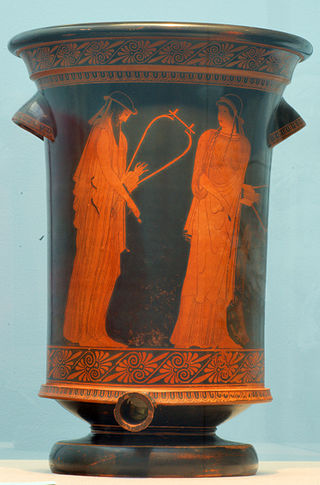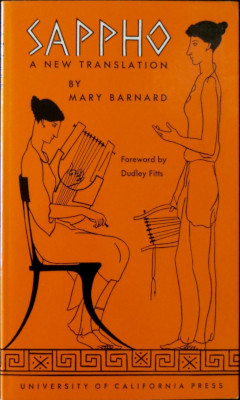Related Research Articles

Alcaeus of Mytilene was a lyric poet from the Greek island of Lesbos who is credited with inventing the Alcaic stanza. He was included in the canonical list of nine lyric poets by the scholars of Hellenistic Alexandria. He was a contemporary of Sappho, with whom he may have exchanged poems. He was born into the aristocratic governing class of Mytilene, the main city of Lesbos, where he was involved in political disputes and feuds.

Sappho was an Archaic Greek poet from Eresos or Mytilene on the island of Lesbos. Sappho is known for her lyric poetry, written to be sung while accompanied by music. In ancient times, Sappho was widely regarded as one of the greatest lyric poets and was given names such as the "Tenth Muse" and "The Poetess". Most of Sappho's poetry is now lost, and what is extant has mostly survived in fragmentary form; only the Ode to Aphrodite is certainly complete. As well as lyric poetry, ancient commentators claimed that Sappho wrote elegiac and iambic poetry. Three epigrams formerly attributed to Sappho are extant, but these are actually Hellenistic imitations of Sappho's style.

Tragedy is a genre of drama based on human suffering and, mainly, the terrible or sorrowful events that befall a main character. Traditionally, the intention of tragedy is to invoke an accompanying catharsis, or a "pain [that] awakens pleasure,” for the audience. While many cultures have developed forms that provoke this paradoxical response, the term tragedy often refers to a specific tradition of drama that has played a unique and important role historically in the self-definition of Western civilization. That tradition has been multiple and discontinuous, yet the term has often been used to invoke a powerful effect of cultural identity and historical continuity—"the Greeks and the Elizabethans, in one cultural form; Hellenes and Christians, in a common activity," as Raymond Williams puts it.

Modern lyric poetry is a formal type of poetry which expresses personal emotions or feelings, typically spoken in the first person.
Anne Patricia Carson is a Canadian poet, essayist, translator, classicist, and professor.
Aristotle's Poetics is the earliest surviving work of Greek dramatic theory and the first extant philosophical treatise to focus on literary theory. In this text Aristotle offers an account of ποιητική, which refers to poetry and more literally "the poetic art," deriving from the term for "poet; author; maker," ποιητής. Aristotle divides the art of poetry into verse drama, lyric poetry, and epic. The genres all share the function of mimesis, or imitation of life, but differ in three ways that Aristotle describes:
- Differences in music rhythm, harmony, meter, and melody.
- Difference of goodness in the characters.
- Difference in how the narrative is presented: telling a story or acting it out.

Ancient Greek literature is literature written in the Ancient Greek language from the earliest texts until the time of the Byzantine Empire. The earliest surviving works of ancient Greek literature, dating back to the early Archaic period, are the two epic poems the Iliad and the Odyssey, set in an idealized archaic past today identified as having some relation to the Mycenaean era. These two epics, along with the Homeric Hymns and the two poems of Hesiod, the Theogony and Works and Days, constituted the major foundations of the Greek literary tradition that would continue into the Classical, Hellenistic, and Roman periods.
Jonathan Culler is an American literary critic. He was Class of 1916 Professor of English and Comparative Literature at Cornell University. His published works are in the fields of structuralism, literary theory and literary criticism.

Erinna was an ancient Greek poet. She is best known for her long poem The Distaff, a 300-line hexameter lament for her childhood friend Baucis, who had died shortly after her marriage. A large fragment of this poem was discovered in 1928 at Oxyrhynchus in Egypt. Along with The Distaff, three epigrams ascribed to Erinna are known, preserved in the Greek Anthology. Biographical details about Erinna's life are uncertain. She is generally thought to have lived in the first half of the fourth century BC, though some ancient traditions have her as a contemporary of Sappho; Telos is generally considered to be her most likely birthplace, but Tenos, Teos, Rhodes, and Lesbos are all also mentioned by ancient sources as her home.
Anactoria is a woman mentioned by the Ancient Greek poet Sappho as the object of her desire in a poem known as Fragment 16. Another poem by Sappho, Fragment 31, is traditionally called the "Ode to Anactoria", though no name appears in it.

Nossis was a Hellenistic poet from Epizephyrian Locris in Magna Graecia. Probably well-educated and from a noble family, Nossis was influenced by and claimed to rival Sappho. Eleven or twelve of her epigrams, mostly religious dedications and epitaphs, survive in the Greek Anthology, making her one of the best-preserved ancient Greek women poets, though her work does not seem to have entered the Greek literary canon. In the twentieth century, the imagist poet H. D. was influenced by Nossis, as was Renée Vivien in her French translation of the ancient Greek women poets.

Neoclassical Hellenism is a term introduced primarily during the European Romantic era by Johann Joachim Winckelmann.
Rush Rehm is professor of drama and classics at Stanford University in California, in the United States. He also works professionally as an actor and director. He has published many works on classical theatre. Rehm is the artistic director of Stanford Repertory Theater (SRT), a professional theater company that presents a dramatic festival based on a major playwright each summer. SRT's 2016 summer festival, Theater Takes a Stand, celebrates the struggle for workers' rights. A political activist, Rehm has been involved in Central American and Cuban solidarity, supporting East Timorese resistance to the Indonesian invasion and occupation, the ongoing struggle for Palestinian rights, and the fight against US militarism. In 2014, he was awarded Stanford's Lloyd W. Dinkelspiel Award for Outstanding Service to Undergraduate Education.
Nationality words link to articles with information on the nation's poetry or literature.
Nationality words link to articles with information on the nation's poetry or literature.

Greek lyric is the body of lyric poetry written in dialects of Ancient Greek. It is primarily associated with the early 7th to the early 5th centuries BC, sometimes called the "Lyric Age of Greece", but continued to be written into the Hellenistic and Imperial periods.
Froma I. Zeitlin is an American Classics scholar. She specializes in ancient Greek literature, with particular interests in epic, drama and prose fiction, along with work in gender criticism, and the relationship between art and text in the context of the visual culture of antiquity. Zeitlin's work on establishing new approaches to Greek tragedy has been considered particularly influential.

Virginia Walker Jackson is UCI Endowed Chair in Rhetoric at the University of California, Irvine. She is one of the founders of historical poetics and of the new lyric studies, and is credited with "energiz[ing] criticism" about Emily Dickinson in the twenty-first century. She is more recently credited with revising the racialized history of American poetics, as the poet Terrance Hayes writes, “If there is a kind of ‘poet’s poet,’ might there also be a kind of ‘poet’s scholar,’ someone a poet reads for lucid, explosive doses of insight and history? Yes: Virginia Jackson. Actually, she’s more than a poet’s favorite scholar, she is a poet’s favorite pathfinding detective. Her brilliant Before Modernism is a radical reorientation of American lyric literary assumptions. Virginia Jackson unearths the overlooked, undervalued Black poets at the root of modern American poetry, and every branch of contemporary poetry trembles with new fruit.” Her research includes nineteenth-century American poetry, the history of American poetry, comparative literature, lyric theory, the history of criticism, the history of poetics, and genre theory.

Sappho: A New Translation is a 1958 book by Mary Barnard with a foreword by Dudley Fitts. Inspired by Salvatore Quasimodo's Lirici Greci and encouraged by Ezra Pound, with whom Barnard had corresponded since 1933, she translated 100 poems of the archaic Greek poet Sappho into English free verse. Though some early reviewers criticised Barnard's choice not to use a more structured meter, her translation was both commercially and critically successful, and her work has inspired subsequent translators of Sappho's poetry.
References
- 1 2 Emily Wilson (7 July 2017), "Found in translation: how women are making the classics their own", The Guardian
- 1 2 Yopie Prins: Department of Comparative Literature, University of Michigan, retrieved 15 September 2017
- 1 2 Yopie Prins: Home page, University of Michigan, retrieved 15 September 2017
- ↑ Kathryn Shattuck (14 May 2000), "A Symphonist of Elvis and Barbie", New York Times